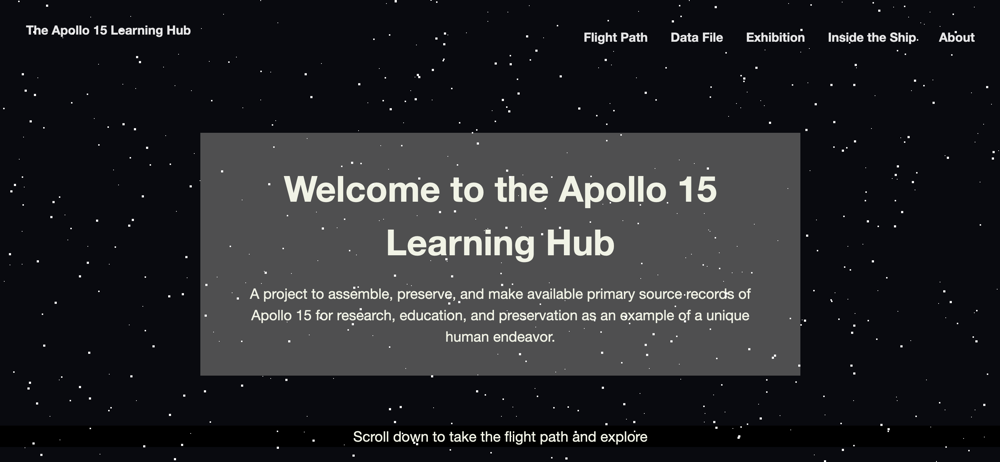Emory University Center for Digital Scholarship (ECDS) Launches Digital Learning Hub to Mark Apollo 15 Moon Mission’s 50th Anniversary
From Emory University:
In celebration of the 50th anniversary of the Apollo 15 Mission, the Emory Center for Digital Scholarship (ECDS) has launched a new digital learning hub that assembles, preserves and makes available primary source records of Apollo 15 for research, education, history and as an example of a unique human endeavor.
The hub will offer access to a digital archive of Apollo 15 onboard materials, an interactive 3D model of the lunar module and links to reliable primary sources of Apollo history.
Launched July 26, 1971, Apollo 15 was the fourth lunar landing mission and the first extended scientific exploration of the moon. It became the first Apollo mission to carry the Lunar Roving Vehicle to the moon’s surface, which astronauts used to explore the geology of the Hadley–Apennine region.
“We are excited to share this unique collection of primary source documents, including the Apollo 15 Flight Data File, one of the most complete ‘as flown’ Apollo flight archives, shared in the Readux online reading and publishing app,” says Joanna Mundy, digital projects specialist at ECDS. “We have worked with faculty, staff and graduate and undergraduate students across the university since 2016 to build the Hub, which offers support to educators, researchers and students in studying Apollo 15 in its original historical context.”
Learn More, Read the Complete Announcement
From the Emory Center for Digital Scholarship (ECDS)
Several members of the ECDS Project Team have provided details about their involvement with the Apollo 15 Learning Hub. Work included creating and managing the Omeka site, an interactive visualization that lets users explore “Inside the Lunar Module,” digitizing and aggregating video content, conducting and compiling research about primary sources, flight path/landing page and UI design coding, and more.
[Clip]
The Learning Hub also includes a media collection, built in an Omeka database, providing original sources in images, video, audio, and other documents. Omeka is an open-source database web-publishing platform for the display of library, museum, archival, and scholarly digital collections and the creation of media-rich online exhibits. The Apollo Learning Hub Team, particularly ECDS Senior Software Engineer Yang Li, has uniquely styled the Omeka template design to convey the Apollo media in a clear searchable way. Finally, Dr. Arya Basu (Visual Information Specialist), with the support of Ian Burr (Visual Design Specialist) and David R. Scott Fellows Sarah Warren and Dimitri Zaras, has developed a 3D interactive model of the Lunar Module that gives users a physical and practical sense of how the Cue Card documents were used on the Moon.
Read the Complete Post
Direct to Apollo 15 Mission Digital Learning Hub
Filed under: Archives and Special Collections, Data Files, Digital Collections, Digital Preservation, Interactive Tools, Libraries, News, Patrons and Users, Publishing
About Gary Price
Gary Price (gprice@gmail.com) is a librarian, writer, consultant, and frequent conference speaker based in the Washington D.C. metro area. He earned his MLIS degree from Wayne State University in Detroit. Price has won several awards including the SLA Innovations in Technology Award and Alumnus of the Year from the Wayne St. University Library and Information Science Program. From 2006-2009 he was Director of Online Information Services at Ask.com.



